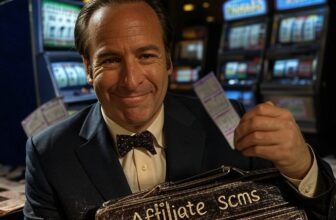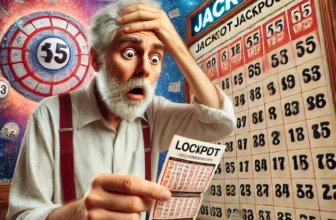So, you want to start your own lottery, huh? Maybe you’re dreaming of watching ticket sales skyrocket as hopeful players line up for their shot at life-changing riches (and you get to skim a bit off the top, of course). Or perhaps you just think it’ll be fun to make everyone in town chase a pot of gold while you sit back like the Wizard of Oz. But before you get too carried away with visions of jackpots and confetti, let’s talk about the small detail that separates your lottery from a Ponzi scheme: legality.

Setting up a lottery isn’t as easy as scribbling some numbers on a napkin and calling it “Lucky Lou’s Cash Bonanza.” In fact, depending on where you are, there’s an entire universe of regulations, licenses, and eyebrow-raising fees waiting for you. And yes, every penny counts—no one’s impressed if the grand prize is a $50 gift card and a pat on the back.
In this guide, we’ll walk you through the thrilling (and often paperwork-laden) journey to setting up a legit lottery. We’ll cover the riveting world of licenses, the joy of audits, and even where to find those mysterious lottery machines you’ve seen on TV. It may not be as glamorous as watching the big win unfold, but hey, nobody said jackpot dreams come without bureaucracy.
So, buckle up! If you’re serious about turning this dream into reality, it’s time to find out just how much fun government paperwork can be.
1. Why Start a Lottery?
So, you’re considering starting a lottery. You’ve got two options: either you’re a saint, aiming to fundraise for some noble cause, or you’re eyeing a profitable side hustle with visions of rolling in ticket sales. Either way, welcome to the club! The lottery business is as close as most people will ever get to feeling like a financial wizard, making people believe in the “just one ticket more” magic of striking it rich.

Starting a lottery sounds thrilling for a few reasons:
- Fundraising with Flair
Want to raise money for charity or community projects? Nothing says “philanthropy” like dangling a jackpot in front of people’s faces! Suddenly, that boring bake sale can’t compete with the glitz of your shiny new lottery. And hey, who needs a few cookies when you can offer them a chance at a prize that’s almost definitely not their money back? - Adding a Little Excitement to the Neighborhood
We’ve all heard that “all work and no play” line, right? A lottery can add a dose of excitement to your community—just imagine the local buzz around the latest numbers and the grand prize announcement. It’s like starting your own mini casino but with everyone cheering you on. And as long as you’re within the legal guidelines, it’s totally legitimate fun (yes, those exist). - The Elon Musk Method
Of course, if you’re feeling particularly bold, you could always take a page out of Elon Musk’s playbook. Recently, he set up a “voter sweepstakes” for the U.S. presidential election, promising $1 million a day to one lucky registered voter from each of seven battleground states. All participants had to do was sign a petition in support of his cause and cross their fingers. Legal lottery? Charitable sweepstakes? A little questionable, according to a Philadelphia District Attorney who filed a lawsuit claiming this stunt was actually a thinly veiled attempt to influence voters under the guise of a lottery. It’s the type of scenario that makes you wonder: when does a lottery become a legal issue, and when does it become a Musk move? - Because Who Doesn’t Dream of Being the Next Lottery Mogul?
For some, it’s all about the thrill of running the show. Managing the jackpot, ticket sales, and dreaming up those enticing winning odds has its appeal—especially when you’re the one holding all the cards (literally). After all, if the major lotteries can pull it off and bring in millions, why not you? Just keep in mind that, unlike the big guys, you might not have a legal team on speed dial. But hey, nothing a good Google search on “lottery laws” can’t fix, right? - It’s Not Gambling… It’s “Supporting a Cause”
Remember, lotteries aren’t just about making money; they’re also about “making dreams come true.” Whether it’s the dream of a community garden, a new sports facility, or a well-funded PTA, lotteries give people a reason to feel good about tossing their money into the pot. It’s the ultimate combo: a touch of altruism with a dash of “what if.”
In the end, starting a lottery has its allure—just don’t get too swept up by the glitter of jackpots without seeing the mountain of rules, regulations, and licenses waiting behind it. Because here’s the truth: if you’re willing to jump through enough hoops and dot enough i’s, you might just have yourself a little cash cow. Just remember, there’s a fine line between being the hero of your own lottery story and getting tangled in legal red tape. Choose wisely!
2. Basic Steps to Start Your Own Lottery
Alright, so you’ve decided to dive into the glamorous, regulation-packed world of lottery operations. Starting a lottery may seem like a quick way to fulfill your entrepreneurial dreams (or your desire to be everyone’s favorite cash-giver), but it’s not as simple as printing some tickets and shouting, “Win big!” Here’s a basic roadmap to get you started without ending up on the wrong side of the law.

- Research (Yes, It’s Necessary)
Before your lottery empire can rise, you need to do your homework. What kind of lottery are you running? Will it be a raffle-style, scratch-off tickets, or a digital number-draw format? Research all types, from national powerhouses to office raffles. You’ll also want to look into your competitors—yes, that includes big-time players like Powerball and the smaller, community-led ones. Knowing the landscape helps, so you’re not reinventing the wheel (or drawing numbers out of thin air). - Check the Legal Maze
Here’s the fun part: understanding the legal side. Starting a lottery requires a pile of permits, licenses, and approvals that can vary by country and even by state. You’ll need to check with your local regulatory authority—think UK Gambling Commission, state governments in the USA, or similar bodies—to find out the exact requirements. If all those rules seem overwhelming, just remember: they’re there to make sure you don’t turn into the next gambling scandal headline. - Secure Funding
Contrary to what you might hope, a successful lottery doesn’t magically finance itself. You’ll need an upfront pool of funds to cover prizes, marketing, lottery machines (more on those below), and administrative costs. The last thing you want is to sell hundreds of tickets and realize you’re a bit short when the jackpot needs paying out. Consider getting investors on board, or even starting with a smaller prize pool if you’re just testing the waters. - Buy the Fancy Machines
Forget about drawing numbers from an old hat; you’ll need some proper equipment. Lottery machines, for example, don’t come cheap. Companies like Smartplay and Gravity Pick Machines offer legit, regulation-approved machines that do everything from number drawing to ping-pong ball rolling (no really). Expect to spend anywhere from a few thousand to tens of thousands, depending on how professional and “flashy” you want to go. - Hire an Auditor (Yes, You Read That Right)
Now, I know what you’re thinking—“An auditor? I’m just starting a simple lottery!” Well, yes, but one that needs to be fair, legal, and transparent. Hiring an auditor or independent overseer ensures your operation stays above board and builds trust with players. An auditor’s role is to verify that everything’s done fairly and without a trace of shady dealings—unless your goal is to make headlines for all the wrong reasons. - Marketing and Ticket Sales
Here’s where the magic happens. Think about your target audience and how to reach them. Are you targeting locals in your community or aiming for the big leagues with nationwide reach? Traditional printed tickets are still popular, but digital platforms are taking over. You’ll need a website, social media presence, and maybe even some flashy ads to let people know about the potential life-changing riches waiting for them. The key? Sell the dream without overselling it. - Prepare for Taxes and Legalities
Did you think running a lottery meant pocketing all the proceeds? Think again. There are taxes, regulatory fees, and administrative costs that’ll cut into your revenue. Many countries have stringent rules on what percentage of ticket sales should go towards prizes, which means you’ll need a good accountant or financial advisor to keep track of it all. - Launch with a Bang
Finally, it’s showtime! Host an epic launch event, make sure your website is live (and can handle traffic), and hype up the first drawing day. The launch is your chance to capture people’s interest and establish your lottery’s “brand.” Go big, go bold, and don’t forget to have an enthusiastic host to add some pizzazz—because nothing says excitement like someone screaming, “Today’s jackpot is ONE MILLION DOLLARS!”
Running a lottery might sound as simple as “sell tickets, collect money,” but it’s more like managing a small company complete with legal checks, financial planning, and a fair share of hoop-jumping. But get these basics right, and you’re well on your way to turning your lottery dream into a reality. Just remember, if Elon Musk can pull off a million-dollar sweepstakes, there’s hope for all of us.
3. Regulatory and Licensing Requirements by Country
Setting up a lottery may sound straightforward, but every country has its own set of rules, licenses, and paperwork that turns your “simple idea” into a bureaucratic obstacle course. And let’s face it—governments aren’t just going to hand over the keys to the kingdom of cash without first making you jump through some serious hoops. So, grab your finest pen and your patience, because here’s a whirlwind tour of what’s required to set up a legal lottery across some major regions.

United Kingdom: The Land of Strict Compliance
In the UK, running a lottery isn’t as simple as sticking “win big” on a banner and calling it a day. You’ll need a license from the UK Gambling Commission if your lottery is for profit or even if it’s just a non-profit public draw (because everyone loves paperwork). And they don’t hand these out like candy, either. You’re looking at a rigorous application process, with checks to ensure you’re financially responsible, socially responsible, and, yes, morally upstanding.
Then there’s the fact that lotteries here are classified into different categories: National Lottery, Large Society Lottery, and Small Society Lottery. Each has its own set of criteria, from prize limits to how the revenue must be allocated. So, unless you want a strongly worded letter from the Commission, you’ll need to play by the book.
United States: Fifty States, Fifty Different Rules
If the UK’s rules sound complicated, the USA takes it to the next level. With fifty states, each boasting its own laws, you could practically write a novel on the regulations alone. Some states are all for lotteries (like New York and California), while others have outlawed them entirely (sorry, Utah and Hawaii).
Most U.S. states require a license from both state and sometimes county authorities. And the type of license depends on your lottery’s scope. National sweepstakes? Brace yourself for federal regulations, tax obligations, and thorough compliance checks. You’ll also need to comply with the Interstate Wire Act if any part of your lottery crosses state lines, as well as the Federal Trade Commission regulations if you’re promoting it online. Sound exhausting? Welcome to the USA, where nothing involving money comes easy.
Canada: Polite but Paperwork-Heavy
In Canada, lotteries are a government affair, with only the provincial governments legally permitted to run them. So unless you’re aiming to become Canada’s next provincial premier, you won’t be setting up a nationwide lotto anytime soon. However, if you’re going for a charity-based lottery, you might be in luck. Each province has its own regulations for charitable lotteries, and you’ll still need a license, a clean record, and all the proper documentation.
Don’t be fooled by Canada’s polite reputation—they’ll expect you to fully disclose your organization’s purpose, financials, and how much of the proceeds will actually go to charitable causes. It’s not a get-rich-quick scheme, but if you’re passionate about a cause, Canada’s charitable lotteries might be your golden ticket.
European Union: The Mixed Bag of Rules
If you’re thinking, “Surely the EU will be simpler,” think again. While the EU offers a lovely assortment of pastries and cross-border travel, it doesn’t provide unified lottery laws. Each member state runs its own lottery regulations, so what’s legal in Germany might be illegal in Italy.
Most EU countries require you to have a government-issued license, and if you’re planning on operating a cross-border lottery, prepare to face a labyrinth of rules and a mountain of paperwork. Some countries, like France and Spain, have strict state monopolies on lotteries, while others, like Malta, are more open to private operations (hence why so many online gaming sites are based there).
Australia: It’s All Fun and Games Until the Compliance Check
Australia loves a good lottery, but if you want to start one, get ready for the Australian Competition and Consumer Commission (ACCC) to check everything from prize distribution to advertising practices. You’ll need a license from the relevant state or territory, and you’ll be under the watchful eye of both the ACCC and the Australian Communications and Media Authority (ACMA).
There are also restrictions on prize values and how the lottery is marketed, to keep things fair and responsible. And, like the UK, lotteries here are divided into categories, with different rules for charity lotteries versus commercial ones. Want to skip out on these steps? Don’t. Australians take lottery compliance seriously, and a breach could mean hefty fines.
Starting a lottery isn’t for the faint-hearted, especially with each country layering on its own unique blend of rules and regulatory red tape. But once you’ve navigated these requirements, you’ll be on your way to joining the global family of licensed, legal, and compliant lotteries. So, as you fill out your applications and double-check your compliance forms, remember: bureaucracy might be a headache, but it’s a small price to pay for the chance to run a successful lottery (and avoid any “unlawful gambling” charges).
4. Licensing Requirements and Audit Needs
Once you’ve wrangled the general legalities of your target country, there’s still the little matter of licensing. Think of it as the final boss in the game of starting your own lottery—armed with endless documentation, strict deadlines, and a nearly insatiable appetite for fees. But hey, who doesn’t love a little bureaucracy with their business plan?

The License to Print Money… Almost
Securing a lottery license isn’t just about getting the government’s seal of approval; it’s about proving that you’re committed to running a fair, secure, and legal operation. Most jurisdictions require you to submit extensive documentation on everything from your business model to your proposed prize structure, and some may even want to vet your personal financial records. It’s like a job interview but with more paperwork and a dash of “are you sure you’re not a criminal?”
In the United States, each state has its own lottery licensing agency, and they don’t just hand out permits to anyone with a few bingo balls and a dream. You’ll be asked to explain how your lottery will work, how you’ll handle ticket sales, and how you’ll guarantee the integrity of every draw. And don’t forget the all-important “Who Gets What” plan, detailing exactly where the money goes, including prize payouts, administrative fees, and that nice cut for Uncle Sam.
In the UK, it’s much the same, but with added scrutiny on social responsibility. The UK Gambling Commission insists on knowing that your lottery isn’t a front for organized crime (a totally reasonable ask) and that you’re not going to create a nation of addicts along the way. To prove this, you might need to submit everything from staff training programs to financial reserves that show you can actually pay out winners (yes, they’re watching your bank account too).
Audit or Bust: The Need for Regular Checks
If you thought the licensing process was a one-and-done, think again. Many countries require regular audits to make sure you’re still playing by the rules. These audits can be either internal or external, but they all have the same goal: to keep you honest and your players protected.
In the EU, for instance, you’ll often need to arrange third-party audits to verify everything from prize payouts to the randomization of draws. Some lotteries even hire auditing firms to be present at every draw, making sure every ball drop is above board. And don’t even think about cutting corners—the penalties for non-compliance can range from massive fines to losing your license altogether.
Across the pond, U.S. states may require periodic financial audits to confirm that lottery proceeds are being properly distributed. Mismanagement or even just sloppy bookkeeping can lead to serious legal trouble, and many a would-be lottery mogul has seen their dreams crushed under the weight of an audit gone wrong.
Anti-Fraud Systems: It’s Not Just About Checking Boxes
Today’s lottery operators are also expected to use anti-fraud systems to catch any sign of shady business. This could mean investing in top-notch cybersecurity, data encryption, and randomized draw machines to keep everything transparent and tamper-proof. For many regions, showing that you’ve invested in fraud prevention measures is as important as having enough money in the prize pool.
Annual Reports and Public Disclosure: No Secrets Allowed
In many jurisdictions, you’ll need to submit annual reports detailing the financial health of your lottery and possibly publish them for public viewing. Governments are big on transparency, and so are players—no one wants to hand over hard-earned cash to a lottery that might “accidentally” lose the winnings. This level of scrutiny means you’ll be answering to not just regulatory bodies but also a public that wants to know every penny is being accounted for.
So if you’re thinking about skipping any of these steps, consider this a warning: regulatory bodies aren’t exactly forgiving, and the public has little patience for operators who can’t keep track of their own finances. But if you’re prepared, licensed, and open to audits, you’re in good shape to run a compliant and successful lottery.
5. Getting the Right Equipment
Alright, you’ve navigated the endless red tape and convinced regulators that you’re responsible enough to run a lottery. Now comes the fun part—buying all the shiny, lottery-specific gadgets that bring your dream to life! Because let’s be real: you can’t exactly use a bowl of numbered ping-pong balls and a fan (though, on a budget, who’s to judge?). Here’s what you’ll need to run a lottery with all the bells and whistles.

1. The Lottery Machine: Your Star of the Show
The lottery machine is the heart of any lottery operation. This isn’t just some simple plastic contraption you pick up from a party supply store; it’s a high-tech, meticulously engineered device designed to keep the draws random and secure. Lottery machines come in two main types:
- Gravity Pick Machines: Imagine a tank filled with bouncing balls that tumble around until they fall through a chute—pure physics, no fancy electronics. This type is used by some of the biggest lotteries worldwide, like Powerball. They’re durable, reliable, and fun to watch, especially when the numbers start dancing around before plopping into the winning chute.
- Air Mix Machines: These use jets of air to mix balls in a chamber, adding a touch of suspense as the balls swirl and rise through an opening. They’re slightly flashier and perfect if you want to add a bit of drama to your lottery draws (and who doesn’t?).
To buy one, you’re looking at several thousand dollars for a quality machine—if you want the real deal, that is. If you’re in the UK or USA, companies like Smartplay International and Innovative Concepts in Entertainment are reliable sources for professional-grade machines. You might also find high-quality, refurbished ones through niche equipment suppliers. Just make sure the machine is certified for lotteries to keep regulators (and skeptics) happy.
2. Ball Sets: More Than Just Plastic Spheres
Ball sets might seem straightforward, but they’re crucial to keeping your lottery fair and square. Each ball should be perfectly balanced to avoid any “lucky” ones that pop up more often. Lottery balls are often made from special materials, like rubberized plastic, to ensure they’re lightweight, durable, and identical in weight. They’re also numbered and color-coded for visibility during live or televised draws.
Many lotteries own multiple sets, rotating them between draws to maintain randomness and reduce wear. These balls are also subject to regular inspections, often weighed and measured to make sure every single one is as close to identical as possible. After all, you don’t want your lottery players claiming your “lucky ball #7” is rigged!
3. Security Systems: Because Nobody Likes a Fixed Lottery
Security is crucial. From surveillance cameras to secure storage, you’ll need to protect both your equipment and your draw results. Many lotteries operate under strict supervision, using cameras that capture the drawing process from multiple angles. In addition, some go as far as keeping the lottery machine and ball sets in locked rooms, with controlled access and motion-sensor alarms.
To keep things above board, you may even have an independent auditor on-site during each draw. This can be someone from a third-party audit firm, or if you’re really fancy, someone with a magnifying glass and a penchant for uncovering the tiniest anomalies. The auditor’s role is to guarantee that every draw is fair and conducted according to the rules.
4. Backup Equipment: Just in Case
No self-respecting lottery operator goes without backup equipment. This might include an additional ball set, a secondary machine, or a mobile generator in case of power failure. The idea is that if anything goes wrong mid-draw, you’ll have a reliable way to complete it without technical hiccups. Think of it as having a Plan B… or in this case, a Plan “Backup Ball”!
5. Additional Fun and Flash: Lighting, Sound, and Set Design
This one’s optional but worth considering if you’re aiming for a lottery people will remember. Many lotteries add a bit of pizzazz with stage lighting, sound effects, and themed sets. Imagine the excitement of a room where lights flash and music plays as the lottery machine hums to life. It’s the ultimate experience for participants, even if they’re watching from home.
At the end of the day, the equipment you choose depends on your budget, your aesthetic, and how serious you want your lottery to look. Just remember: the more professional your setup, the more legitimate you’ll seem in the eyes of players—and regulators. And with the right gear, you’ll be ready to draw the numbers, award some winnings, and create that perfect lottery excitement that keeps people coming back for more!
6. Marketing Your Lottery (Legally!)
Congratulations, you’ve got your lottery set up, your machines are ready, your licenses are in place, and you’re all set to start the big draw! But wait, how do you get people to actually buy tickets? Enter the marketing phase—where dreams, advertising budgets, and creative legal workarounds collide.
Here’s the thing about marketing a lottery: it’s not quite like promoting your average product. For one, you’re probably dealing with a pretty heavily regulated environment. Unlike that free sample of pizza down at the supermarket, promoting a lottery means adhering to strict advertising standards. But don’t worry; we’ll get you started with some ideas (without landing you in hot water with the regulators).

1. Keep It Honest (or Risk a Slap on the Wrist)
First things first—no, you can’t promise your players a guaranteed ticket to easy street or tell them they’re “one click away” from becoming billionaires. Misleading advertising can get you in serious trouble with authorities. Stick to factual, realistic claims, like the actual odds of winning, prize information, and transparent terms and conditions.
If your ad sounds too much like “Everyone’s a Winner!” the regulators might come knocking. Instead, play up the excitement and possibility while keeping your language grounded. Terms like “Play for a Chance to Win Big!” or “Your Lucky Ticket Awaits” are safer ways to get players interested without bending the truth.
2. Social Media: The Good, The Bad, and The Restricted
Social media platforms are a natural choice for promoting your lottery, but here’s the catch: many platforms (like Facebook and Instagram) have strict guidelines for gambling-related content. Make sure to follow these guidelines, as well as age restrictions that prevent minors from viewing or engaging with your ads.
That said, if you can make it work, social media is a fantastic way to create buzz. Fun posts, live videos of the draw, and even “behind-the-scenes” glimpses of your setup can build excitement and draw in followers. Don’t forget to check the platform’s ad policies first—no one wants their page flagged for violating terms!
3. Partnerships and Sponsorships: Playing Nice with Local Businesses
Want to add some local flair? Team up with businesses to create mutual exposure and brand awareness. For instance, local cafes or shops might agree to display posters, hand out flyers, or even offer discounts to lottery players. This adds a touch of local charm and gives people extra reasons to participate.
If you’re ambitious, you could go for big-name sponsors. Just be cautious—some brands may be hesitant to partner with a lottery due to the stigma around gambling. Choose businesses that align with your brand and that won’t mind being associated with a little bit of luck.
4. Launch Events and Press Releases: Making Headlines, Not Headaches
Launch events can work wonders. Consider a grand opening, with a ribbon-cutting ceremony, a few balloons, and maybe even a mini-celebrity. This gets people talking and provides you with content for press releases. Just remember to phrase everything carefully in the release to avoid legal concerns.
Press releases are also a solid way to reach a broad audience. Send them to local newspapers, radio stations, and TV channels. Emphasize the excitement and thrill of the lottery, while also reassuring the public about its legal and regulatory compliance. A few words like “licensed” and “approved” go a long way in making your lottery sound credible.
5. Email Marketing: The “Sign Up and Stay Tuned” Strategy
For those already in the know, email marketing can be a powerful tool. Use it to send updates about the next draw, special promotions, or winner stories. A little reminder never hurts, and with some enticing language, you can keep your players coming back for more.
Be careful, though! Make sure you’re sending emails only to people who opted in—no one likes a lottery spammer. And remember to follow anti-spam laws; otherwise, you could be facing more than just unhappy recipients.
6. The Celebrity Factor: For When You Want Extra Sparkle
This one’s optional but effective. Getting a public figure to endorse your lottery can add excitement and credibility. A few well-placed mentions on social media or at events can attract attention in a big way. However, be sure that any celebrity mentions follow advertising guidelines to avoid any misunderstandings about what they’re endorsing.
In the end, marketing a lottery requires a balance of creativity and caution. Get the word out, keep things compliant, and watch your lottery gain traction without any unexpected visits from regulators. And who knows—maybe you’ll even go viral. Just remember, a little charm goes a long way, but honesty keeps you in business!
7. Ensuring Security and Transparency
Now that you’ve got your lottery almost ready to roll, here comes the fun part—making sure it’s airtight, honest, and hacker-proof. After all, if people suspect your lottery is anything less than above board, your reputation (and perhaps your business) will be toast. And let’s face it: no one wants their big-ticket lottery dreams dashed because someone rigged the system or fiddled with the numbers.

Set Up Ironclad Digital Security
Imagine this: you’ve built up a following, sold tickets, and the day of the draw finally arrives. Then, boom—your lottery platform is hit by a cyber-attack. Not ideal, right? Secure servers, robust firewalls, and encrypted data storage are essential. This isn’t just about looking professional; it’s about ensuring ticket buyers can trust that their entries aren’t exposed or tampered with. Consider hiring an external firm to conduct regular cybersecurity audits to spot vulnerabilities before anyone else does.
Implement Real-Time Monitoring
People have questions, and they want answers fast. Having real-time monitoring for transactions, ticket sales, and draw results not only keeps everything on track but can also alert you to any suspicious activity immediately. Transparency is key here. By setting up a live feed or real-time stats, players can watch and feel secure that the process is fair.
Appoint an Independent Auditor
An independent auditor isn’t just someone in a fancy suit ticking boxes—it’s your best friend in proving you’re not a shady operation. Depending on where you operate, you might even be legally required to have an external auditor review and validate your draws and results. Plus, publishing a brief summary of the audit’s findings (in plain, human language) can build serious trust with your audience.
Visible Terms and Conditions
Finally, clear terms and conditions can be your best defense. Avoid the temptation to bury them in legal jargon no one can understand. Make sure your players know exactly how the draw works, what to expect in case of disputes, and what protections are in place for them. This is transparency gold.
Broadcast the Draw
Want to squash any suspicions? Broadcast your draw live, or at the very least, record it and upload it where players can watch. You could even add a bit of spectacle (confetti cannon, anyone?) to make it feel like an event. Players will appreciate the extra effort to make everything as transparent as possible.
When all’s said and done, ensuring security and transparency isn’t just about compliance. It’s about building credibility and creating a lottery people feel excited (and safe) to play.
Conclusion: Is Starting a Lottery Right for You?
So, after all this, you might be asking yourself, “Is starting a lottery really the path I want to take?” Well, if you love navigating a maze of regulations, enjoy balancing transparency with thrilling prize announcements, and don’t mind the occasional side-eye from suspicious competitors or regulators, then maybe you’re onto something.
Starting a lottery isn’t for the faint of heart—or for those short on funds or patience. But it’s also a chance to create something that, with the right approach, can bring joy, hope, and a bit of thrill to people’s lives. And hey, maybe it’s just crazy enough to work.
If the idea of managing massive amounts of data, ensuring security down to the last digit, and broadcasting live draws doesn’t scare you off, then perhaps running a lottery could be your calling. Just remember: in the end, it’s all about earning the public’s trust and keeping things fair, secure, and fun.
So, are you ready to roll the dice and get started, or is it time to fold? Either way, you now have a roadmap to what goes into setting up a lottery. Who knows—maybe your lottery will be the next big jackpot sensation. But if not, hey, at least you now know what you’re getting into!

References
- Official Regulatory Bodies:
- UK Gambling Commission: www.gamblingcommission.gov.uk
- U.S. Federal Trade Commission (FTC): www.ftc.gov
- State-specific authority example, Pennsylvania Gaming Control Board: gamingcontrolboard.pa.gov
- Key Legislation:
- UK Gambling Act 2005: Available on legislation.gov.uk
- U.S. Federal Wire Act: Overview on justice.gov
- Audit and Security Resources:
- Audit firms such as KPMG, PwC, and Deloitte provide security and transparency guidelines within the lottery industry.
- Lottery Industry Standards:
- World Lottery Association: world-lotteries.org
- North American Association of State and Provincial Lotteries (NASPL): naspl.org
- Equipment and Supplier Information:
- Lottery equipment suppliers like Smartplay International: smartplay.com
- Arrow International for secure ticketing: arrowinternational.com
- Anecdotal Context:
- Coverage of Elon Musk’s voter sweepstakes controversy by trusted news outlets, and statements from Philadelphia’s District Attorney’s Office for verification.







